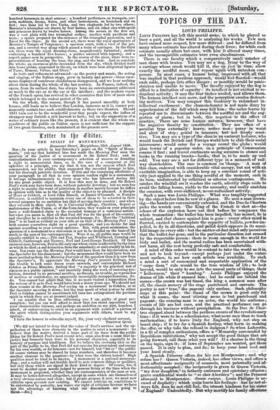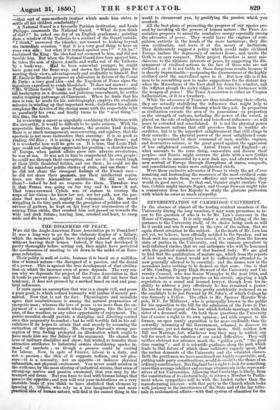TOPICS OF THE DAY.
LOUIS ,PHILIPPE.
Loris Purrirrn has left this mortal Scene, ,in which hp played so busy a part, and all the world is analyzing his works. -Yew men have earned more respect; few more distrust : and he differed from many whose estimate has altered during their-lives.; for while such estimate usually alters but once; 'With- }rim it filtered' many times, and the incompatible estimates were even simultaneous. There is one faculty which a. -.comparatively small number of men share with brutes. You may see dog, Eying", in the way of a carriage whose crush Would-till it, rise up just la time allow exactly the needful romii;"-andt repose''iigairi wltIi fithrokeri com- posure. In most cases; :a Ifinnan bOihe,TialpiWatiettleith/ill that
was implied in thatperilous approach,: "dturtstid-ft'would mar aside, perhapa into dtherklanger ; orificAtiihifikfuld *c-
stricken and finable to Moie. The faculW,-injtoykt by the dog is allied to a limitation -of capacity : its intelleetifiiniiiii•tetted to' re- dundant activity; it seea the four inches Ineeded,ifinfflilloWfithera. The human intellect sees more, and thepelibnitiStelefeitiss; distract- motives. Yon ' may &Mauer this '-'tgnIletiliy7 to redundant in- tellectual- excitement : the chanioie-Irrififer is ficCiiiitde dizzy by apprehension of the fall'Which *WV kill ; .thi*Sailor learns by repeated use to discriniinater bet ii the needfalaet tiiid the sng- gpstion of_elarm ; but in both, rthis negation 4(s' the .'effect of Pra0tit.' There are some hiinien'20fitaree,• ' hoWeveli,v tifirt have the negative 'faculty' by e o n s tit utiefi.• • They are ,Witen of a peculiar type externally : heavy, active•• men ; pursyi in waist and alert 'of step ; genial 'in-nitinnerair'31rtitmliot deeply : You may sec a type ofthe eleaffinittifierdinent lecturer, who would teach the British and tOrigirVforldifdiv to cliik their social intercourse; would cater for .a voyage round" the globe ; Would plan towns of a superior order, on a principle-of Communism eoranie 11-faut ;"and travel continents seeing germ:mein stones and books in the running brooks—books, that is, to!be made up and sold. You may see a not far-, difdirent type in a Menarch of rait- way shareholders. • The race is-common on 'change: 'A man Of this class, endowed with considerable vital energy, but not with an excite:hie imagination, is able to keep up a constant round of • actii. vity just applied to the one thing needful at the moment, each in its turn; undiCtractOd byr collateral or ulterior' contingencies. He catches the windfall ere it leaches the earth, adroitly steps aside to avoid the falling house, yields to the necessity, and coolly snatches the occasion, with ever4taffieient, never-redundant activity. Such a num was Lonit Philippe. What Was tangibly suggested by the object before him he saw at a glance. - He sees a man drown- ing—the hands are conveniently extended, and the Due de Chartres picka the wretch' out,:, 'The ling of tke French is shot at—the echoefrof the explosiok`hallif not died beforelre compasses the whole transaction : the ballet has been impelled; has missed, he is unhurt, and that chance against him is gone : every other' mind is flurried, excited to contemplate-the-capacity of bullets, powder-im- pelled, to fly in all dire:66w), and:palhd-defithappears in its mani- fold image every side but the matterK,f4act Miod onlyiperceives that the bullet has gone, =din the particular direofionMat erossed by the respectable person: 'there is rocan enough: in • the World for body and bullet, and the mortal radius his been ascertained with.. out harm, all the rest being perfectly safe and Comfortable.- A mind of this order would be content to take the world as it is, and not to look beyond—except perhaps just under the outer- most surface, , to see how each article . was ' available. To such a mind a sort of economical and -respectable application of the " carpe diem" rule would be the true wisdom of life • to look beyond, would be, only to see into the unreal parts of things, their " hollowness," their " humbug." Louis Philippe enjoyed the drama-of life while it amused him ; but he could see behind the seenes-the crown was but tinsel, the king: a common man after all, the classic scenery of the stage pasteboard and canvass: The poetry is mit " true," the:pageant only surface. • Seek philosophy stops at this point: the ; tinsel of . the crown is good , only for what it seems, the • mosflatirring scene is but pasteboard and pageant; the cunning maxi' is an actor, the world his audience ; events of life are but cues, and the practised 'performer can go through his business without precipitation. So the Due de Char- tres stepped about between the perllous _events of the revolutionary time : if it were to be a schoolniaster,•whatmore easy thaatostea mathematics; if to leave, Italy for England, why not step board ship ; if 'to toy for aSpann& footing, what harm in making the offer, or why take the refusal in dfidgeon P So when Lafayette, in a fit of complex enthusiasm, offers a "Monarchy surrounded by Republican institutions," why not accept the good things that are going forward, call them what you will ? If a charter is the thing on the tapir, sign it ; 'if laws of September are wanted, get them passed. It is only to plan, and do ; to keep your head cool, and
your hand steady. • • , •-
A Spanish Princess- offers for his son Kontpensier ; and why refuseiher ?...taneen Victoria, indeed; has .other,views, and offerers most affectionate reciprocity of counsels, most.paternally andiff- feetionately accepted: the reciprocity is given to Queen Victoria, "my dear daughter," in fatherly embraces and epistolary effusion ; grave confidential words to ee cher Aberdeen "'; and the Princess aforesaid to Montpensier. -Sunni cuique. Louis Philippe is ac- cused of duplicity; which quite hurts his'feelinge: has he not al- wa s felt, does he not still feel, the utmost kindness for his sister
of d? Undoubtedly. But why mortify his family affections —that sort of man-motherly instinct which made him strive to settle all his children comfortably?
A National Guard is a favourite Parisian institution, and Louis Philippe commands the National Guard. " What do you think of that ? " he asked one day of an English gentleman • pointing from a window of the Tuileries to a sentinel of the Guard outside. " I think," answered the islander, not unused to looking beyond the immediate occasion, " that it is a very good thing to have on your own side : but what if it turned against you " " Ah ha! " exclaimed the King : the idea had not occurred to him, and did not trouble-him. But when the National Guard does turn against him, he takes the arm of Queen Amelie and walks out of the Tuileries by a back-way. Had he been somewhatyowler, he might have gone out the front-way, and shown the Parisians plans for meeting their views, advantageously and creditably to himself. But H. Emile deGirari;n• proposes an abdication in favour of the Count de Paris : a very good idea—and the Napoleon of reace signs the ingenious expedientto evade bloodshed. It does not answer ; and "1.1r, William Smith" la* in England: retiring from inonarchi- cal bankruptcy in a decorons and judicious, concealment, he settles under reigning patronage*, Claremont. When be, finds that his race is run, he sends for his autobiography, employs the available minutes in winding up that important work, distributes his adieus, completes the devoirs of the closing scene with the respectable Eclat so peculiarly his own, and finally turns to the " next thing"— this tinw, the tomb. la reviewing a career se siagniarlycombining the felicitous with the unworthy, it would be diffienit to be quite serious. With the respectable motives, the good-nature, the genuine kind feeling, there is so much management, maneuvering: and cajolery, that the spectacle is not more instructive, than amusing: it is as good as reading Gil Blas ; it is seeing a railway stag on the throne ; and it is wonderful how well he gets on. It is true, that Louis Phil- ippe oonld not altogether{ appreciate his position : a churchwarden of Europe, when parish affairs grew into adverse revolutions, he, was at sea. It was not in him to comprehend. his own people : liaconld see through their corruption, and use it ; he could laugh 'at their little theatrical foibles' and use them ; he could see the drift of his ministers' politic strokes of state, , and use them : but he did not share the strongest feelings of the French race— he did not share their passions, nor their intellectual aspira- tions, nor their Alexandrine ambitions. He did not share them ?—indeed he had no response for them. Therefore was it that?, France was going on her way and he knew it not. That tower-crowned Cybele was of stature to overtop the scope of his vision—he lmew her not, nor her path, nor the pas- sions that moved her, mighty and vehement, As the insect wriggling in its tiny path among the, precipices of pebbles and the ravines of gutters, he kept on his busy way unconscious of the coming Titan stride, that crushed him and passed on towards the wide and dark future.; leming him, .crushed and hurt, to creep aside and the in peace.



























 Previous page
Previous page